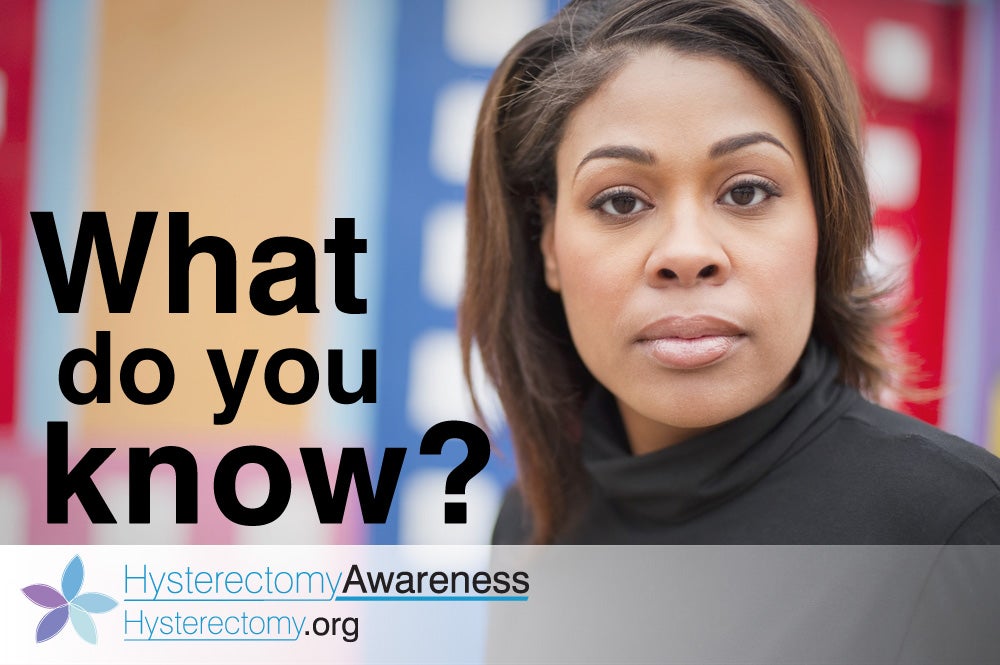Reasons NOT to have hysterectomy
A hysterectomy is a major surgery which can affect you from head-to-toe. While for most women the outcome is positive, there are others for whom the results are negative and regretful.
Although over 500,000 hysterectomies are done each year in the United States, many women could benefit from less invasive, alternative treatment options which come with less risks and long term implications. While there are compelling reasons for having a hysterectomy, there are also several reasons NOT to have one. Below are five of those reasons.
1. BIRTH CONTROL
A hysterectomy is not a reasonable choice for permanent birth control. It is a major surgery and as such hysterectomy complications and side effects can occur which can negatively impact your life forever. Rather than remove your uterus to prevent a pregnancy, there are multiple, less invasive birth control options which you can consider.
2. ELIMINATE PERIODS
A hysterectomy is not a reasonable option for eliminating the routine bleeding that goes along with normal periods. If you wish to stop or minimize the monthly bleeding, there are several other options you can consider: an endometrial ablation, certain IUD’s, hormones given in an injection, continuous birth control pills, and more.
3. MANAGE PMS, PMDD, MENOPAUSE
All or most of the symptoms related to PMS, PMDD, and menopause symptoms are caused by hormones produced by the ovaries. As such, removing the uterus to manage these symptoms may not offer any benefits. Instead, the hormonal changes and other issues causing PMS, PMDD, and menopause symptoms need to be understood and addressed.
4. ASYMPTOMATIC FIBROIDS
Fibroids which do not cause symptoms rarely require a hysterectomy and may not require medical treatment at all. For problematic fibroids, there are multiple treatment options besides a hysterectomy which can be considered, including non-surgical fibroid treatments or outpatient options such as MRgFUS, uterine artery embolization (UAE/UFE), Acessa, and more. To learn about all of the possibilities for you, speak to your gynecologist, a second gynecologist, and/or an interventional radiologist who performs fibroid treatments. Based on your symptoms or lack of symptoms, you and your medical team can decide if a wait and see approach for your fibroid is best, or if you need do need to consider choosing another fibroid treatment.
5. MINOR PROLAPSE, BLADDER OR BOWEL ISSUES
A hysterectomy is not usually warranted for minor prolapse, bladder or bowel issues as there are many less invasive options for managing these concerns without removing the uterus. Pessaries, kegels, avoiding lifting, and losing weight can all help with minor pelvic organ prolapse. For minor bladder and bowel issues, bladder training, strengthening pelvic muscles, certain medications, and/or lifestyle adjustments can be helpful. If you have minor prolapse, bladder, or bowel issues, you can benefit from working with a knowledgeable urogynecologist and/or pelvic floor physical therapist, both of which may be able you manage any symptoms while avoiding a hysterectomy and all of its implications.
Reasons to have hysterectomy
There are four compelling reasons for which a hysterectomy may be the only means of treatment:
1. CANCER
A gynecologic cancer diagnosis is the most compelling reason to have a hysterectomy. If you have been diagnosed with ovarian, uterine, endometrial, cervical, or vaginal cancer, it is important to consult with a gynecologic oncologist as soon as possible. Quick action can help minimize spreading, upstaging, and other risks. You should also seek a second opinion to help you determine the best treatment for you. Working with your oncologist will help you manage your diagnosis, choose appropriate treatment, and manage follow-up care.
2. GYNECOLOGIC GENETIC MUTATION
Having a gynecologic genetic mutation is another reason you may need a hysterectomy. A genetic counselor can help you understand and explore your options if you have tested positive for a genetic mutation such as BRCA or Lynch Syndrome. A genetic counselor can also be helpful if you are affected by DES hereditary mutations. Working with your genetic counselor and a gynecologic oncologist, you can determine if a prophylactic hysterectomy and/or oophorectomy would minimize your chances of being diagnosed with cancer.
3. LIFE-THREATENING, UNCONTROLLED, AND/OR EXCESSIVE BLEEDING
Uterine hemorrhaging that is life-threatening, uncontrolled, and/or excessive can create serious medical conditions which require immediate treatment. Complications from pregnancy, delivery, surgery, or bleeding disorders can create this type of bleeding situation, and, in some cases, emergency surgery may be necessary. If you experience this type of bleeding, it is critical that you seek immediate medical attention. Quick treatment could help you avoid an emergency hysterectomy.
4. DISRUPTIVE, UNRESOLVED GYNECOLOGIC CONDITIONS
There are several gynecologic conditions which can cause disruption in a woman’s life: abnormal uterine bleeding, endometriosis, adenomyosis, uterine fibroids, pelvic prolapse, pelvic congestion, and pelvic inflammatory disease. Though these conditions are not life-threatening, if they are not resolved with alternative treatments they may progress or lead to other health concerns. If you have one of these conditions, you should try less invasive and minimally invasive options before choosing a hysterectomy.




